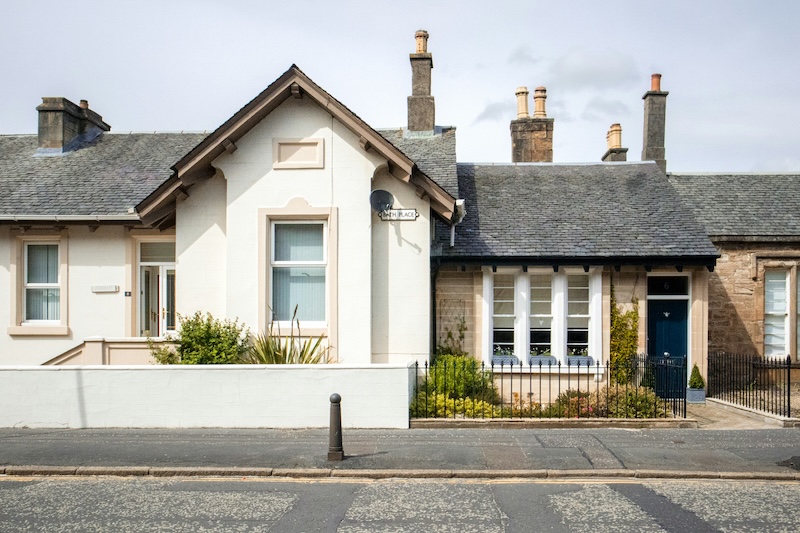How Much Is Building Insurance?
Hint: Protecting the bricks and mortar you call home can cost less than you’d think.

Hint: Protecting the bricks and mortar you call home can cost less than you’d think.

The average cost of buildings insurance in the UK depends on a few factors, including your rebuild cost and any optional extras you choose. A well-structured buildings insurance policy offers valuable protection for your home’s structure.
Let’s explore what goes into the cost of Buildings insurance and how you can tailor your cover to fit your needs and budget.
There are a few core factors that go into every buildings insurance quote:
Your home insurance provider calculates your premium using details like your property’s age, construction materials, location (down to your postcode), and the cost of rebuilding your home—not its market value. Lemonade, for example, offers unlimited rebuild cost cover, insuring you for whatever it takes to restore your home after events like fire, subsidence, or storm damage.
Enhancing your level of cover with add-ons will impact your insurance price. Popular options include:
| Add-on | What it Covers |
|---|---|
| Home Emergency Cover | 24/7 helpline for issues like boiler breakdowns or burst pipes (up to £1,000 per event) |
| Legal Protection | Covers legal fees if you need to pursue or defend a claim |
| Accidental Damage Cover | Pays to repair accidental mishaps (think DIY gone wrong) |
| Household Member Extension | Expands your policy to include a partner or family members |
The deductible, also known as excess, is how much you agree to pay when you make a claim. With Lemonade Buildings insurance, you’ll need to set two different excess amounts:
A higher voluntary excess will mean lower monthly or annual home insurance premiums, though you’ll need to cover more out-of-pocket if things go wrong.
Here’s what buildings insurance covers as standard, protecting your home and offering essential support when you need it most:
| Built-in Cover | How It Protects You |
|---|---|
| Unlimited Rebuild Cost | Pays whatever it costs to fully repair or rebuild the structure of your home |
| Temporary Accommodation | Covers hotel or rental costs during major repairs (alternative accommodation) up to £50,000 |
| Owner’s Liability | Protection of up to £2.5 million if you’re legally responsible for injury or damage to others as the owner of your home |
Optional extras like home emergency cover or accidental damage cover can help you create an insurance policy that gives you true peace of mind.
Looking to save on your buildings insurance? Here are a few ways to bring down the cost:
Insurance may not stop fires or theft, but it provides a financial cushion if the worst happens. By getting buildings insurance tailored to your needs, you can rest easy knowing your home is protected.
Take the first step, and get a quote with Lemonade today.
Yes, most mortgage lenders in the UK require homeowners to have a buildings insurance policy as a condition of the loan. This protects the lender’s investment if your property suffers major damage. Be sure to check your mortgage agreement for specific requirements. Remember, it’s your responsibility to arrange suitable cover.
Buildings insurance covers the structure of your home—including walls, roof, and permanent fixtures—against events like fire or burst pipes. Contents insurance, on the other hand, covers personal belongings and valuables inside your home. Many insurers offer a combined policy that gives both types of home insurance cover in one package.
A combined policy, covering both the structure and your possessions, often works out cheaper than two separate policies. Bundling can also make it easier to manage your home insurance claims in the event of a major incident.
Yes, listed buildings usually cost more to insure because their unique features and historic construction can make repairs or rebuilding more expensive. Special materials and skilled labour are often needed to meet conservation standards. Mention your property’s listed status when getting a home insurance quote.
Make sure your sum insured covers the full rebuild cost of your property, not just its market value. With Lemonade you won’t have to worry about it since we offer unlimited cover to rebuild your home. Also take a look at your policy each year, especially if you’ve renovated, added an extension, or upgraded your security. Think about what level of cover and optional extras work best for you to keep your home fully protected.
Please note: Lemonade articles and other editorial content are meant for educational purposes only, and should not be relied upon instead of professional legal, insurance or financial advice. The content of these educational articles does not alter the terms, conditions, exclusions, or limitations of policies issued by Lemonade, which differ according to your state of residence. While we regularly review previously published content to ensure it is accurate and up-to-date, there may be instances in which legal conditions or policy details have changed since publication. Any hypothetical examples used in Lemonade editorial content are purely expositional. Hypothetical examples do not alter or bind Lemonade to any application of your insurance policy to the particular facts and circumstances of any actual claim.